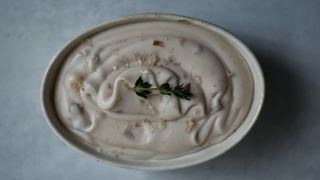If you enjoy this article, or any other content from this website, please subscribe to the newsletter. Your support can make a big difference!
Butter is pretty much one of the most decadent cooking fats that has been around for over 4000 years but has been best mastered by the French.
On my backlog of recipes, was a Medjool date butter, which I have been dying to make after I tried it at a restaurant in London The date butter was light and airy, and had the perfect balance of sweet and salty. Served with a slice of warm homemade sourdough, it was perfectly splendid and I haven't been able to stop thinking about it since. Funnily enough, it's the only thing I remember about that meal.
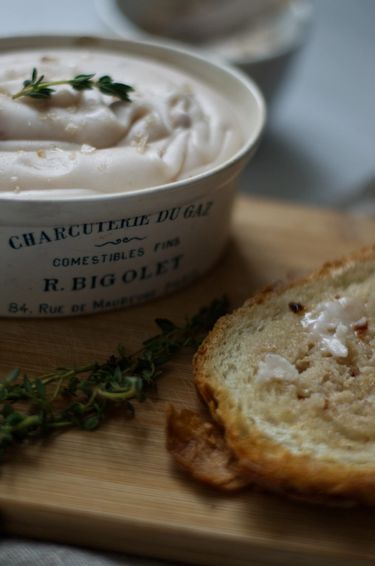
Now that I've been trying to seek alternatives to dairy, I took the plunge and decided to make my very own vegan butter.
But that's not all. What's all the more exciting is that I used essential oils in my cooking — something I would have never thought of.
Lately, I've developed a keen interest on essential oils and how the impact one's wellbeing. I consciously switched to more natural products in my skincare and household goods. I've even begun to make my own soy wax candles using only essential oils.
What are Essential Oils?
Essential oils are incredibly potent oils — some of which have been around for centuries — are extracted from plants to capture their flavours, scents, and overall beneficial properties.
They make for a great addition to your skin, hair, and healthcare collection, and can also be used for cleaning, food prep and aromatherapy.
The Truth about Essential Oils
Pure essential oils are usually costly, as it takes hundreds to thousands of pounds of plants to make one pound of pure essential oil. Purchasing an essential oil today is an easy task. But when it comes to choosing a high quality and pure product, things can get tricky, and even overwhelming! There are countless companies that are selling oils, and new ones are added to the market all the time. And while most of them claim to sell the purest and most tested products, unfortunately, many of them are lying!
What makes an essential oil pure or fake?
An oil that is produced using chemical and synthetic fillers, or an oil that is adulterated through a mix of cheap seed oil and nuts, can be toxic and harmful.
It’s good to know that reliable companies—those committed to producing 100% pure and safe oils—normally take the following precautions to ensure the quality of their products:
- Sustainable and responsible sourcing (they provide extensive information about where their oils come from).
- Extensive and thorough testing (they test their oils for adulteration and contamination).
- Clear and accessible safety and usage information for customers.
- Transparency (they use third-party testing and make the test results public).
- Storage and handling: the oils are carefully processed, packaged, and stored to avoid chemical alterations caused by exposure to heat or light.
Shopping for Pure Essential Oils
Whilst there are a handful of companies selling essential oils, it's best to do your due diligence. I consulted a few lists of commendable essential oil companies, and decided to try one called 'doTERRA' based on them ticking all the right boxes.
Not only is Doterra a household name in essential oils, since its inception in 2008. It has also been able to help communities improve their own economic futures through its Co-Impact Sourcing® model and the doTERRA Healing Hands Foundation™.
What are the benefits of using Essential Oils in Food?
By using essential oils, not only are you adding a flavour punch to your food but you are also benefiting from the chemical properties of the plant.
By using essential oils, you are also reducing waste and saving money as the oil last much longer than fresh produce, especially if you know you'll be using it sparsely.
Cooking with DoTERRA Essential Oils
As doTERRA's oils are pure and potent, you would need only the slightest amount of oil to add to your cooking. For this recipe I used doTERRA's Thyme essential oil. The best method to cook with essential oils like Thyme is to use the toothpick method. Dip the toothpick in the essential oil and drop it into the food, until you get the desired amount of thyme. Check out this guidebook for more info on how to use essential oils in food.
You can get your doTERRA oils in Malta by reaching out to mrsproutmalta, run by Luke who is an expert in doTERRA's products and is also running a 90-day makeover action plan using doTERRA's products, to demonstrate how essential oils can positively impact your wellbeing both inside and out.
Watch out for my next few posts to see what I will do with more of doTERRA's essential oils.
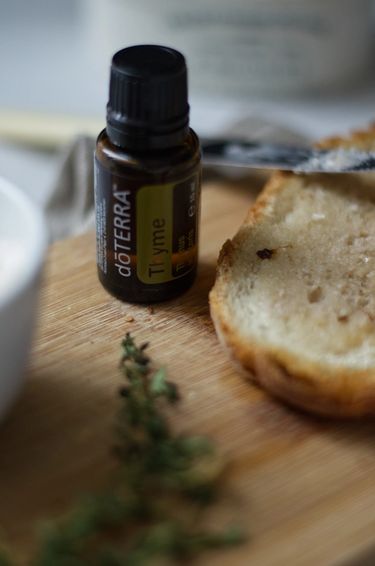
How to Make Vegan Butter
Now, whilst I can talk endlessly about essential oils, we're also here to talk about vegan butter. The vegan butter I made was whipped but you can also make standard butter.
All you need is a stand mixed and a few simple ingredients such as coconut oil and soy milk. Then you're able to spice it up like I did, with dates and doTERRA's Thyme essential oil. Just remember to use refined coconut oil as unrefined coconut oil will make your butter taste like coconut.
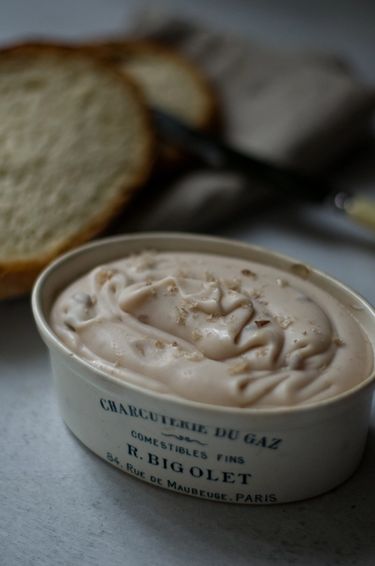
Here are the steps for a simple whipped vegan butter:
- In a bowl, combine 60ml unsweetened soy milk and 1 tsp apple cider vinegar. Let it sit and curdle while you melt the coconut oil.
- To the bowl, add a 108g of melted, warm refined coconut oil, along with 1/4tsp of the salt, 30ml vegetable oil (or light olive oil/neutral oil), and 30ml of coconut cream (optional). For the flavouring, add 3 finely chopped Medjool dates and 1/2 tsp of date syrup.
- Whisk well for a couple of minutes until smooth.
- Add just one drop of thyme essential oil. More and it will overpower your butter.
- Set the bowl in the fridge for about 20 minutes until it hardens slightly.
- Take it out of the fridge, and, with a hand mixer, mix and whip until fluffy.
- Place in containers and back in the fridge to harden the rest of the way. Sprinkle with Maldon salt flakes before serving.
If you like this recipe, spread it like butter! Or spread it all over delicious Maltese bread: If you've never tried it, read about the history of Maltese bread here.
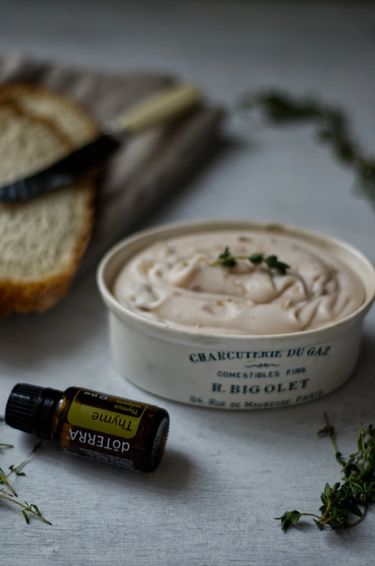
How to Store Vegan Butter
Vegan butter is good for two weeks in the fridge. Otherwise, you can store it in the freezer for about 3 months.
Vegan Date Butter with Thyme and Smoked Salt
No reviews yet
Description
A deliciously easy plant-based spread for anytime of the day
Information
- Servings
- 1.5sticks of butter
- Preparation time
- 15minutes
- Cooking time
- 0minutes
Ingredients
- 60mlunsweetened soy milk
- 1tsp, apple cider vinegar
- 108grrefined coconut oil
- 0.25tsp, salt
- 30mlcoconut cream (optional)
- 30mlvegetable oil
- 3medjool dates, chopped
- 1.5tsp, date syrup
- 1drop, doTERRA Thyme essential oil
Method
1. Curdle the plant milk
Get out a medium sized bowl. Add the soy milk and apple cider vinegar, stir and let sit for 5 minutes until it curdles.
2. Heat the refined coconut oil
While the milk/vinegar curdles, melt the coconut oil in the microwave (or stove) until warm, but not too hot.
3. Mix all the ingredients together
To the bowl with the milk/vinegar mixture, add the melted coconut oil, salt, canola oil, coconut cream, chopped medjool dates, date syrup . Whisk well until smooth. This will take less than 5 minutes. Following that, add a drop of doTERRA's Thyme essential oil.
4. Whip the butter
After you have whisked the butter mixture well, place the bowl in the fridge for 20 minutes so it slightly hardens. Remove it from the fridge and, with a hand mixer, mix and whip until light and fluffy, 3-4 minutes. Add to glass storage containers and place back in the fridge to harden.
Notes:
- If you don't find Medjool dates, use regular dates. Medjool dates are recommended because Medjool dates have a rich, almost caramel-like taste and a soft, chewy texture whereas regular dates, commonly called Deglet Noor, are usually smaller and have a firm flesh and a sweet, delicate flavour.
- If you don't have soy milk, use any other type of unsweetened plant milk
- Stick to refined coconut oil unless you want your butter to taste like coconut. You will be able to tell that the coconut oil is refined from its label.
- If you don't have apple cider vinegar or can't eat it, you can substitute lemon juice or white vinegar.
- I really like the coconut cream in the butter. It doesn't make it taste like coconut, but it adds a creaminess and softness. You can skim the top of a can of full fat coconut milk to get only the cream, or use a can of coconut cream.
